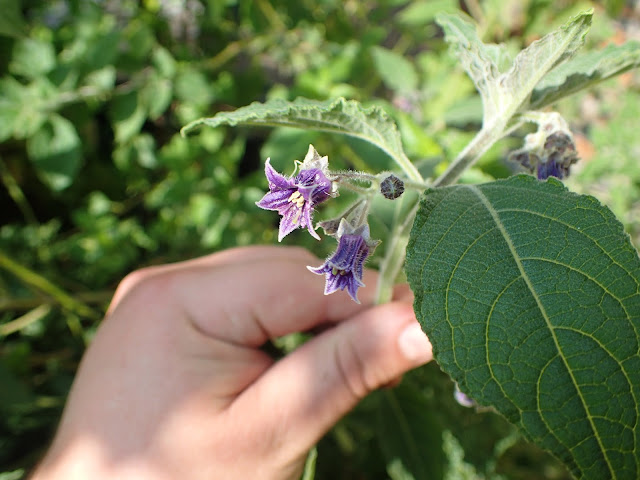Genus
Jaltomata
belongs to family Solanaceae.
There occur about 60 species in Central and South America. They have often
edible fruits and small but sometimes very ornamental flowers. Some species are
herbaceous perennials which creates annual shoots and permanent undergrown
tuberous rhizomes. Other ones are evergreen or deciduous shrubs with (half-)
woody stems. Fruits – berries with large calyxes – similar in structure to
small tomatoes are black or orange (rarely red) colored. The taste of them is
various depending to species. They can be more or less easily propagated by
seeds (sown surface, GA3 can help). I tried to grow 6 species.
 |
| Jaltomata sinousa (Tomatito) |
The most known is Jaltomata procumbens (Stoop Jaltomato,
Black Jaltomato). It is herb to
1.8 m high (but usual smaller), erect to procumbent, often branched, with
underground tuberous rootstock. The flowers are white or pale yellow, hairy and
fruits black (rarely green). It is native to Central and South America (from
Arizona to Ecuador). The fruits tastes not very well raw, but can be used to
making delicious jams. Some accessions are very easy to growing in temperate
areas but other are difficult. I grew two forms: one bought in seed-shop (very
easy and fruited abundantly, fruits dropped down when riped) and the second one
gathered from wild state from Mexico. The last was difficult and unless it grew
large and flowered freely but it created only a few fruits (which did not fall
down).
Jaltomata
procumbens (the form commercially sold as fruiting plant)
 |
| The flower |
 |
| Ripening fruits |
 |
| Ripe fruits |
 |
| The coin on the photos is size about 2,5cm = 1inch |
Jaltomata procumbens (the wild form from
Mexico)
 |
| Unripe fruit |
The closest cousin of J.procumbens is Jaltomata tlaxcala (Green Jaltomato) –
it is even recognized by scientists as one of the green fruit forms of the first
species. They both are very similar but fruits are yellow-green when ripe (they
fall down then) and the taste of J.
tlaxcala is much better – sweet and aromatic, very good also raw. Both
these species can be easy grown as annuals but I am trying now wintering the
tuberous rhizomes in slightly moist soil in pots and in Sphagnum moss in cellar
(in cool temperatures but protected before a frost).
Jaltomata tlaxcala
 |
| The ripe fruits of this species are yellow-green and very sweet |
Next species which I grew with success is Jaltomata
sinuosa (Tomatito, Mishuñan, Tungay, Curving Jaltomato) from
Venezuela, Colombia, Ecuador, Bolivia
and Peru (it is probably Incan cultivate relict). This is erect plant
which grows to about 1-2 m = 3-7ft tall in one season. The leaves of this
species are quite hairy, flowers lovely blue and fruits orange with good taste
raw. It is a perennial shrub which can die back and resprout in cooler climate,
but is not resistant to frosts. It can be also grown as annual or can be
wintered on windows sill in warm, sunny place (or also probably shortly in
cool, dark cellar). It starts to flowering also during long days in temperate
northern summer and fruits easily.
Jaltomata sinuosa
 |
| Unripe fruits |
 |
| The fruits fall down when ripe |
I tried growing 3 other species (also from Peru)
yet, but without success (they not fruited). The reason can be lacking of pollinators,
or possible (but I am not sure it) self-incompalibity (I grew only 1 plant of
each species).
The first of them is Jaltomata bernardelloana (Sogorome
de la Castilla, Bernardello’s Jaltomato). It is (half-)woody shrub 1-2 (5) m = 3-7 (16) ft tall
with orange fruits. It creates medium size ovate hairy leaves and very
ornamental purple flowers. It started to flowering early in my 50° N latitude,
so I have a hope that in next years it will create fruits yet.
Jaltomata bernardelloana
 |
| Young seedling |
Jaltomata
cajacayensis (Musho, Cajacay Jaltomato). It is very little know plant. It is small
evergreen half-woody shrub and has rather small leaves and twisted, very well
branched twigs. The flowers are very small and whitish. Fruits are orange
colored. It started to full flowering very late (in end of September) so it can
be very difficult to growing in northern temperate areas in open gardens.
Jaltomata
cajacayensis
 |
| The seedling |
 |
| The flowers are very small but lovely |
The last species which I grew is Jaltomata
ventricosa (Sorogome, Ventricose
Jaltomato) from northern Peru. This is erect herbaceous shrub to
1,5m = 5ft tall with glabrous leaves. Flowers of this species are very lovely
and fruits orange colored, but this is probably stricte short-day-flowering
species and it have not flowered at all in my experience.
Jaltomata
ventricosa
 |
|
It is day-length sensitive blooming plant and
it has never flowered in my experience
|
There exist numerous other Jaltomata species yet. If you have seeds
of any of them please write to me.






























My Jaltomata tlaxcala are fruiting now. Germination was inhibited by the unusually hot weather, but once they came up, growth was quite rapid. I'm hoping I can ripen the fruit indoors. Thanks.
ReplyDeleteI am growing Jaltomata herrerae and bernardelloana. I will post progress after the growing season is over
ReplyDeleteI'm growing Jaltomata Bernardelloana from seed in Lithuania (USDA zone 6). The seedlings just sprouted and are very thin and flimsy, which is normal for such small seeds. They're currently in a germination box with a transparent lid. We don't get much sun here, so I'll probably have to use growlights year round for them. In a few years, I'll let you know if I had any success with producing berries :D
ReplyDelete